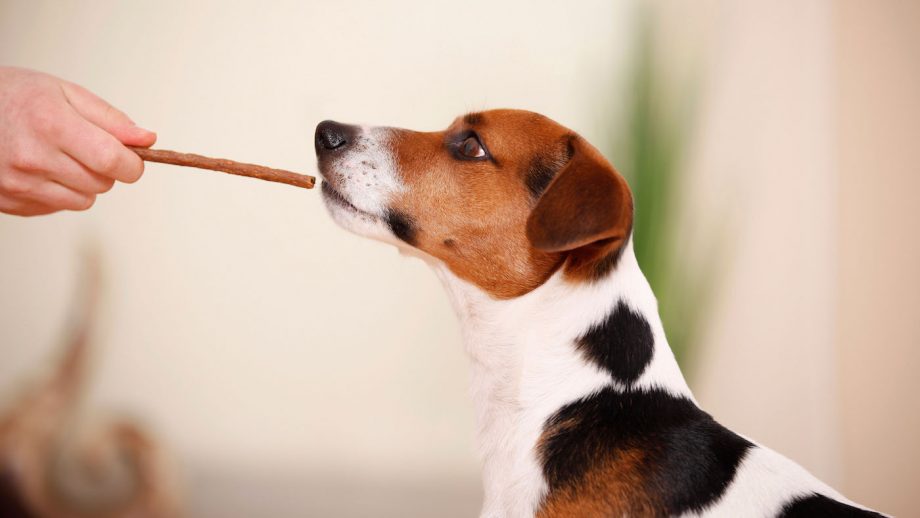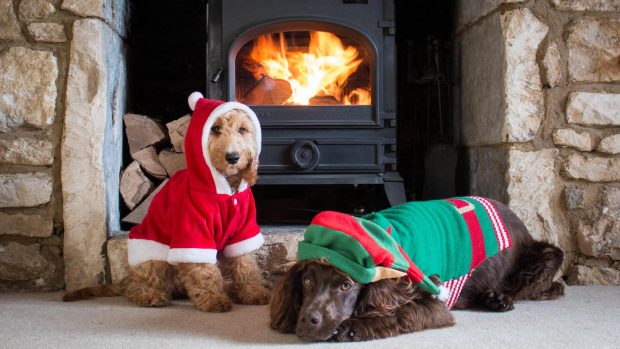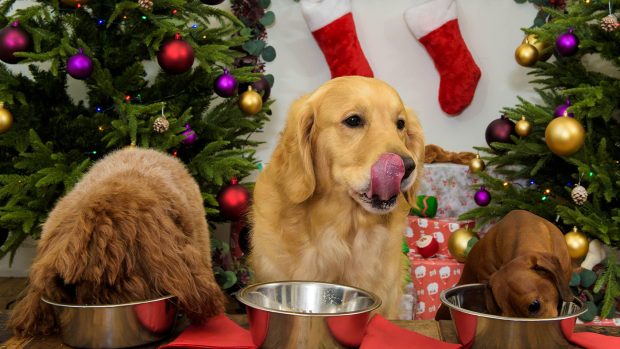Dogs seem a resilient type. Street dogs in many countries survive on raiding through people’s garbage, and many domesticated dogs tidy up the scraps that drop from our tables. But we shouldn’t be haphazard about what we let them clear up as many foods that humans can eat without problems are toxic to canines. Before letting our precious pooches eat anything that is not in their normal daily meals, we need to know exactly what foods are harmful to dogs.
The most dangerous time of year in terms of dogs gobbling up potentially toxic food is Christmas time. There’s plenty of inappropriate food lying around, owners are busy and dogs sometimes at a loose end. The Kennel Club found that dogs were 75% more likely to be treated for poisonous food in December than any other month, while a British Vets Association survey done in 2019 found that 82% of vets had seen at least one case of toxic ingestion over the Christmas break that year.
H&H’s resident spaniel, Fidget, has himself fallen foul of the Christmas binge, having to be rushed to the vet not once but twice in 2021 after helping himself to a bag of chocolate coins on both Christmas Eve and Boxing Day. Mercifully he was caught in the act, and so received swift veterinary attention.
But while Christmas is often the peak, we need to be vigilant all year round that our pet is not ingesting anything that might cause him trouble. While we know a dog shouldn’t eat deadly nightshade, how about a “harmless” scrap of fruitcake? You may be surprised by some of the foods that can be very dangerous.
What not to feed your dog: 10 common foods
Allium species (onions, garlic, leeks, shallots, chives)
These common vegetables contain disulphides and thiosulfinates, which are toxins that damage a dog’s red blood cells, potentially causing life-threatening anaemia which can develop over a few days. Bear in mind that alliums are often hidden in meals, such as stews, soups, gravies and the like. Avoid feeding it either raw or cooked.
Blue cheese
Dogs are particularly sensitive to the fungus present in blue cheese, which can cause muscle tremors and seizures.
Candy
Sweets, sugar and fatty things generally aren’t good for dogs, as they can cause pancreatitis. Watch out for vomiting, diarrhoea and lethargy.
Chocolate
Theobromine, a chemical in chocolate, is poisonous to dogs. Unlike with humans, the darker the chocolate, the worse it is for dogs. Can cause vomiting, diarrhoea, tremors, heart problems and even death. You can buy special dog-safe chocolate though (like these chocolate drops available on Amazon).
Cooked bones
Cooked bones are brittle and can splinter and penetrate digestive parts or cause an obstruction.
Grapes (and raisins, currants, sultanas)
The dried form of vine fruits is believed to be even more toxic than the fresh form. They can cause problems from stomach upsets to kidney failure. Bear in mind dried fruit is often hidden in other foods such as curries, fruit cakes, mince pies and so on.
Macadamia nuts
Cause vomiting, tremors, weakness and lethargy.
Mouldy food
Would you eat it yourself? We didn’t think so. Mould contains a variety of toxins which can cause tremors and seizures.
Raw dough
Bread dough containing live yeast can cause bloat and twisted gut as the bread dough swells in the stomach. This can decrease blood supply to the stomach and even interfere with breathing.
Xylitol
This artificial sweetener is present in many foods (especially those labelled “sugar-free”) and products designed for human consumption, which normally wouldn’t be given to your dog, but may be lying around. These include chewing gum, drinks, toothpaste and some medicines. Xylitol has a strong effect on canine blood sugar levels, causing them to drop dramatically, potentially resulting in liver failure. Some peanut butters also contain xylitol, so dog-safe peanut butter (like this one available on Amazon) is a good option for filling Kong toys and lick mats.

Peamutt Butter | Amazon.co.uk
This dog-safe peanut butter is a good source of protein, and contains heart healthy fats, vitamin B, niacin and vitamin E.

Take extra care at Christmas
Eating is one of the main aspects of Christmas, but many of the toxic foods mentioned above are incorporated in festive dishes. Watch out for:
1. Onions and garlic in gravy
2. Candy – everywhere, from tree decorations to Christmas stocking fillers to coffee-table treats
3. Chocolate – Yule log, gift boxes, chocolate coins, the list goes on. Remember that dogs have much stronger noses so can sniff out tempting food even when it’s wrapped up.
Vet for natural dog food brand Harringtons Peter Wright says: “Chocolate is by far the most common Christmas Day and festive period emergency. With Halloween over, we all know the danger that chocolate poses to dogs, but do you know the reason why it’s so dangerous?
“An odd chocolate or so is probably not going to do any harm, but a whole box or bar of chocolate can have very serious consequences. Chocolate contains a stimulant called theobromine, which is safe for humans but not for our pets. Theobromine is much more concentrated in darker chocolate and, therefore, more dangerous.
“Milder symptoms of chocolate poisoning include vomiting and diarrhoea, but in more severe cases, they can develop seizures, major heart problems and or even die. So, you should contact your vet for advice and do it sooner rather than later before the toxin is absorbed into the body from the stomach. The vet will give a powerful emetic to make them vomit the chocolate back up. If not seen quickly enough, your loyal companion may need to be admitted for more intensive supportive therapy.
“On the numerous occasions when I have had to administer the emetic, I have noticed that many of the offending chocolates are still in their wrappers! So make sure to store your sweet treats well out of reach, as wrappers are not a deterrent to your furry friend.”
4. Bones in scraps from the turkey or goose. Although you might add some of the meat to your dog’s dinner, be super careful about the presence of small bones.
Peter says: “Show me a dog that can resist such a feast when tasty, cooked meats are nearby. The issue is that cooked bones can be brittle, and sharp shards of bone can pierce a dog’s stomach or intestine. My advice if your dog has ingested cooked bones, is to bulk their regular food out with rice so that, hopefully, smaller pieces of bone can pass through the gut safely.
“The problem then occurs when larger pieces of bone are devoured, which are small enough to be swallowed but are of sufficient size to cause a gastrointestinal blockage. In both cases, you must watch out for vomiting, often a day or two after the kitchen theft occurred. Vomiting is the cardinal sign to say all is not well with your dog’s tummy, and an urgent visit to disrupt your vet’s Christmas celebrations is required. Such cases nearly always result in surgery to remove the bony culprit, along with a very unwelcome festive season vet’s bill.”
5. Raisins
“Fruit cakes and mince pies are abundant over Christmas and full of what my wife calls ‘dead fruit’,” says Pete. “These are typically dried fruits like raisins, sultanas and currants. She knows when taking such a call for me, it’s a case that cannot wait for normal clinic opening times.
“It’s unknown why these mystery ingredients in ‘dead fruits’ cause illness in pets, but it is well established that in some dogs, these tasty morsels have no effect whatsoever, while others become extremely ill or even die as a result of them because they can cause kidney failure.
“Your dog may be one of the lucky ones who get away with it, but there is no way of knowing, so it is my job as a vet to make them vomit as soon as possible to rid the stomach of these potentially fatal ingredients.”
Naturally, while everyone else is being spoiled during the festive season, you might feel your dog is being left out, especially with a disrupted routine. He needn’t be forgotten however; there are plenty of Christmas treats and delicious products on the market that are perfectly safe for him to eat in moderation.
You may also enjoy reading…

Why is my dog vomiting? And is it an emergency?

Do they know it’s Christmas time? The best festive treats for dogs

Top treats to keep your dog happy, healthy – and hopefully more obedient

Doggy Christmas dinner? What’s on the menu?

Best GPS trackers to keep tabs on your pooch

Subscribe to Horse & Hound magazine today – and enjoy unlimited website access all year round
Horse & Hound magazine, out every Thursday, is packed with all the latest news and reports, as well as interviews, specials, nostalgia, vet and training advice. Find how you can enjoy the magazine delivered to your door every week, plus options to upgrade your subscription to access our online service that brings you breaking news and reports as well as other benefits.




